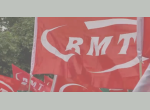CARRYING OUT OUR 2019 PLAN
Know Your Rights’ Campaign
- The credit-card-sized ‘Know Your Rights’ card is now available from j.webb@rmt.org.uk
- We will be producing a poster to advertise it.
- We are asking all regions to set dates for a ‘Disabled transport workers - know your rights’ week.
- We are looking for a volunteer to co-ordinate social media activity around this.
- Head office has agreed to produce a professional version of our short ‘Disabled workers – know your rights’ video.
Other campaigning
- We are reviving our @DP4guards Twitter account.
- We decided to hold a ‘Disabled People for Guards’ protest in September or October, in consultation with DPAC.
- We also decided to hold a London public rally later this year in support of adequate station staffing, with speakers from DMAC, DPAC, an MP, and a visually-impaired doctor who tweeted on this subject.
- We ran some effective campaigning at TUC Disabled Workers’ Conference on accessible transport, guards and station staff.
- Members are invited to submit designs for ‘Disabled People for Guards’ and ‘Disabled People say Staff Our Stations’ logos, which will be used on T-shirts, placards, flags and stickers.
Explaining Disability to Members
Our monthly articles are going very well, but we need more disabled members to write!
Building DMAC and Involving Branches and Regions
DMAC members will visit branches in their regions to speak about issues facing members and the role of the committee, encouraging them to get involved in our activities, to nominate disabled members for any remaining vacancies on the Committee, and to create (and fill!) the post of Disability Officer. The union will pay legitimate expenses that the host branch can not afford to meet.
Special Educational Needs and Disabilities (SEND) funding cuts
- 30 May protests were well-attended. RMT supported and produced a printable poster for placards.
- We will write an article for RMT News.
- The union will contact all members asking them to contact their MP.
Volunteers
We await an update from head office on the representations we have asked the union to make to Severn Valley Railway about its ban on autistic volunteers.
NEC REPORT
A report was circulated of the National Executive’s decisions on the five resolutions from RMT Disabled Members’ Conference. You can read the report here: https://www.rmtlondoncalling.org.uk/content/nec-equal-rights-sub-committee-report-rmt-disabled-members-advisory-committee-july-2019
As there was no NEC member present, we read through the printed report of NEC decisions and discussed our view on them.
i. Personality testing
We were pleased that the NEC agreed to carry out point 1 of the resolution, and are assured that head office will write to employers within six weeks.
However, the NEC decision does not address points 2 and 3, so we would like an explanation of this.
ii. Disabilities Officers
We welcomed the decision of the NEC to recommend to branches and Regional Councils that they create Disabilities Officer posts. Several of the Committee members had already done so in their own branches. Head offices will be writing to all branches and regional councils about this shortly.
iii. Employers’ mental health campaigns
The Committee’s consensus was great disappointment in this NEC decision. We discussed situations in which employers have run ‘mental health awareness’ campaigns, while persecuting our members who are mentally unwell, and imposing working conditions (eg. long, anti-social hours; lone working; management bullying) that worsen mental health. DMAC wants the union to refuse to run mental health campaigns jointly with such employers.
iv. Work programmes for learning disabled and/or autistic people
We welcomed the decision to carry this out in full, and noted that the union would be writing to employers very shortly about this.
We decided to clarify with the union that people on these unpaid schemes could join the union without charge.
v. Know Your Rights campaign
We welcomed the decision to fully implement this resolution. However, we noted that some regions have requested training courses but had no response.
We asked for the following improvements to the way in which NEC decisions are communicated to DMAC members:
1. That the NEC decisions are emailed to DMAC members as soon as they are passed, rather than waiting until the next DMAC meeting
2. That the NEC report to the DMAC meeting include progress reports on implementing the decisions as well as the decisions themselves.
RESOLUTIONS FROM BRANCHES
After debate, DMAC unanimously agreed both the resolutions that branches had submitted:
i) Accessibility of RMT publications (Surrey and Hants branch) - asking the union to produce versions of its publications in audio, large print and dyslexia-friendly fonts. The discussion raised that documents also be made available in suitable colours.
ii) Inclusive union forms (Leeds City branch) - asking the union to review all its forms to maximise their accessibility. The discussion highlighted that this would include membership forms, Credit Union forms, ballot forms and training course application forms, that we would like the DMAC to be consulted as part of these reviews, and that we did not wish to use the term ‘suffer from dyslexia’.
CONFERENCE REPORTS
RMT Disabled Members’ Conference (Plymouth, April): Committee members felt that the conference went very well, and identified a few points for improvement. The Liaison Committee will meet in October to begin preparations for next year’s conference.
TUC Disabled Workers’ Conference (Bournemouth, May): RMT had a greater input and profile than ever before, including running a stall and holding a fringe meeting for the first time. Disabled members are encouraged to put themselves forward to attend the conference.
Scottish TUC Disabled Workers’ Conference Tforthcoming, November). We agreed that we would like the union to submit motions on #haveyougotaminute (Mental Health), and on Special Educational Needs and Disabilities (SEND) cuts.
CONSTITUTION / STANDING ORDERS
The meeting discussed and unanimously agreed two additions to our constitution and standing orders.
1. If more than one motion is submitted on the same subject, these may be composited into a single motion, with amendments if appropriate. This compositing will be carried out by the Liaison Committee in consultation with the branches which submitted the motions. Should any submitting branch not agree to the proposed composite, it will retain the right to move its motion separately.
2. If a member of the Advisory Committee misses two consecutive meetings without giving acceptable apologies, then the General Secretary will contact that member asking for an explanation and for confirmation that they wish to remain a member of the Committee. Their response will be submitted to the next meeting of the Advisory Committee, and if the Committee finds it unsatisfactory, then that member will be deemed to have resigned from the Committee.
Together with the constitution and standing orders agreed at our conference, these will now be tabled to the NEC for approval.
UPDATES ON PREVIOUS RESOLUTIONS
Universal Credit
The NEC has made a decision, but we have not yet been told what it is. Head office to circulate to DMAC members
Training accessibility
The conference passed a resolution asking that training courses held in regions are held in accessible venues. The NEC decision included instructing the General Secretary to confirm that the accreditation process for courses includes accessibility. We asked for an update on this, especially as we are aware that some regions continue to host training courses in inaccessible venues.
Special Educational Needs and Disabilities (SEND) cuts
The RMT Parliamentary group has raised this issue with the Secretary of State. The union has contacted local councils, and will chase up a reply. RMT took part in the demonstrations against SEND cuts on 30 May, producing a ‘Spend on SEND’ placard.
Mental health
The NEC decision on this (in March) included an instruction to the General Secretary to create an action plan and to ask DMAC for our input. This has not yet happened.
NEURODIVERSITY
Committee members asked that the union provide a Stage 2 Neurodiversity in the Workplace course to follow the Stage 1 that it already runs. It was also suggested that there be a session on Neurodiversity in the Disability in the Workplace course.
We may finally see some progress on getting London Underground Ltd to develop a Neurodiversity in the Workplace policy, as TfL is establishing an over-arching Equality Forum.
We noted that Virgin Trains has established a ‘calm room’ for passengers with hidden impairments/conditions at Crewe station. David Johnston will visit Crewe to investigate this, and we will ask ‘Agony Autie’, an autistic activist from Chester, to also give her opinions.
TRAINING
There are currently no scheduled Disability in the Workplace courses, and the only scheduled Mental Health course is fully booked. Delegates expressed frustration with a lack of response from head office to requests for courses in regions. We remind the NEC that it requested training on the social model of disability, but has not yet arranged for this to take place.
ACCESS NEEDS SURVEY AND ADVICE TO BRANCHES
The first set of results of the union’s Access Needs Surevey were circulated, containing lots of useful information about the barriers to members accessing union activities. The union will now contact members again, to try to get more responses.
The next DMAC meeting on 7 October will consider the full results and discuss how to respond.
We are drafting guidance to branches on becoming more accessible to members. We have the survey results; the notes from conference delegates; and an excellent case study. These will be used to draw up the guidance.
OTHER BUSINESS
TfL plans to close its Learning Zone, which provides important courses, including on literacy, dyslexia and dyspraxia. We agreed to oppose this.
We agreed to write to the General Secretary about consulting with DMAC about disability issues.
Janine has a new book coming out in September: ‘The Big J vs The Big C: issues, experiences and poems in the fight against breast cancer’. DMAC agreed to support the series of events planned to follow the book’s publication, which will involve campaigns to defend the NHS.
- Janine's blog
- 3606 reads






